Welcome to our informative article about snakes and their eating habits. Today, we’ll be exploring whether snakes can eat popcorn and discussing the suitable diet for these fascinating creatures. So, if you’ve ever wondered if your slithery friend can indulge in a handful of popcorn with you, keep reading to find out!
When it comes to snakes, their digestive systems are specifically wired to be carnivores. This means that they require whole protein sources for proper nutrition. Unfortunately, popcorn doesn’t meet their dietary needs and can actually cause digestive upset. So, if you were thinking of sharing your movie snack with your pet snake, it’s best to reconsider.
A snake’s diet should primarily consist of small animals such as mice. These provide the essential nutrients that snakes need to remain healthy. It’s worth noting that other reptiles, like turtles, also cannot eat popcorn. Snakes can thrive on a diet of just rodents and don’t require snacks like humans do.
While there are a few human foods that snakes can eat, it’s crucial to research the specific snake breed before feeding them anything other than whole, uncooked proteins like rodents or fish. Their wellbeing depends on it!
Key Takeaways:
- Snakes cannot eat popcorn due to their specific carnivorous digestive systems.
- Their diet should primarily consist of small animals such as mice.
- Snakes do not require snacks like humans do.
- Research the specific snake breed before introducing any human food into their diet.
- Consult with a veterinarian or reptile expert to ensure your snake’s optimal health.
What Do Snakes Eat in the Wild?
In the wild, snakes have a diverse diet consisting mainly of small animals. Their natural prey includes rodents such as mice, rats, and voles. Snakes also feed on birds, consuming both eggs and nestlings. Additionally, they have been known to hunt and eat lizards, such as geckos, skinks, and iguanas, as well as various amphibians like frogs, toads, and salamanders. This wide variety of prey allows snakes to obtain the essential nutrients they need to thrive in their natural habitats.
It’s important to note that different snake species may have specific dietary preferences based on their size, habitat, and hunting behavior. However, all snakes are carnivorous and rely on whole protein sources for their nutrition. In the wild, snakes do not consume fruits, vegetables, or grains like humans do. Therefore, when keeping snakes in captivity, it is crucial to replicate their natural diet as closely as possible to ensure their optimal health.
Snakes’ Natural Prey List:
- Rodents (mice, rats, voles)
- Birds (eggs and nestlings)
- Lizards (geckos, skinks, iguanas)
- Amphibians (frogs, toads, salamanders)
By understanding and providing a snake’s natural diet, we can ensure that they receive the necessary nutrients and thrive in captivity. Feeding them a balanced and appropriate diet will contribute to their overall well-being and longevity.
Can Pet Snakes Eat Popcorn?
When it comes to feeding our pet snakes, it’s important to provide them with a diet that meets their specific nutritional needs. While humans may enjoy snacking on popcorn, this popular treat is not suitable for pet snakes. Snakes have a unique digestive system that is designed for a carnivorous diet, which means they require whole, uncooked protein sources like rodents or fish to thrive.
Feeding snakes a varied diet is not necessary, as they can fulfill all their nutritional requirements with a diet consisting solely of rodents. Popcorn, on the other hand, lacks the essential nutrients that snakes need for proper growth and overall health. Consumption of popcorn by pet snakes can lead to digestive issues and potentially impact their well-being.
While there are a few human foods that snakes can eat, it is crucial to research and understand the specific dietary needs of your snake species before introducing any new foods. When in doubt, it is always best to consult with a veterinarian or reptile expert who can provide guidance on the suitable diet for your pet snake.
What Other Foods Can Snakes Eat Besides Rodents?
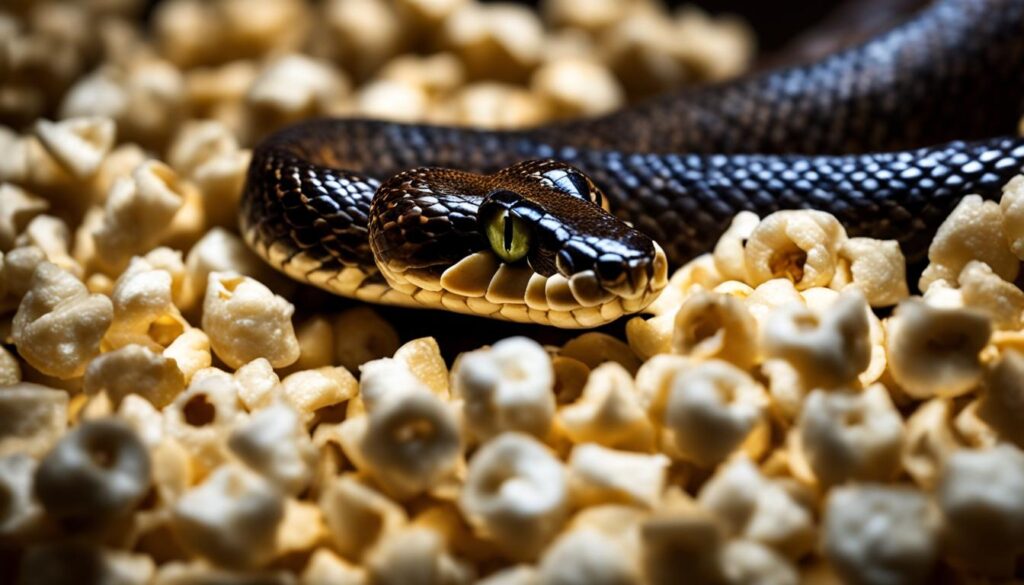
While rodents are the best food for snakes in captivity, there are a few other foods that they can eat sparingly. It’s important to remember that these alternate food sources should only be given as rare snacks and not as a staple part of a snake’s diet.
1. Fish: Snakes can eat fish, but it should be fed in its whole form and only as an occasional addition to their diet. Some snake species in the wild eat fish, but it can cause stomach upset in snakes that are used to a rodent-only diet.
2. Eggs: Snakes can also eat eggs, although most won’t recognize them as prey. Only the whole, uncooked version of eggs should be fed to snakes, and the type of eggs will depend on the snake’s size and species.
3. Other Options: In addition to fish and eggs, some snakes can also eat worms, amphibians, insects, chicks, rabbits, and lizards. However, these should only be given as rare snacks and not as staple foods in a snake’s diet. It’s important to research the specific dietary needs of your snake species before introducing any new foods.
The Importance of a Balanced Diet
While it may seem tempting to experiment with different foods for your pet snake, it’s crucial to provide them with a diet that closely mimics their natural prey items. Rodents are the best option because they offer the necessary nutrients and are easily digestible for snakes. Feeding snakes a varied diet is not necessary, as they can thrive on a diet of just rodents.
Before introducing any new foods to your snake, it’s essential to research and consult with a veterinarian or reptile expert to ensure the food is safe for your specific snake species. Snakes have unique dietary requirements, and it’s important to prioritize their health and well-being by providing them with a balanced and appropriate diet.
What Reptiles Can Eat Popcorn?
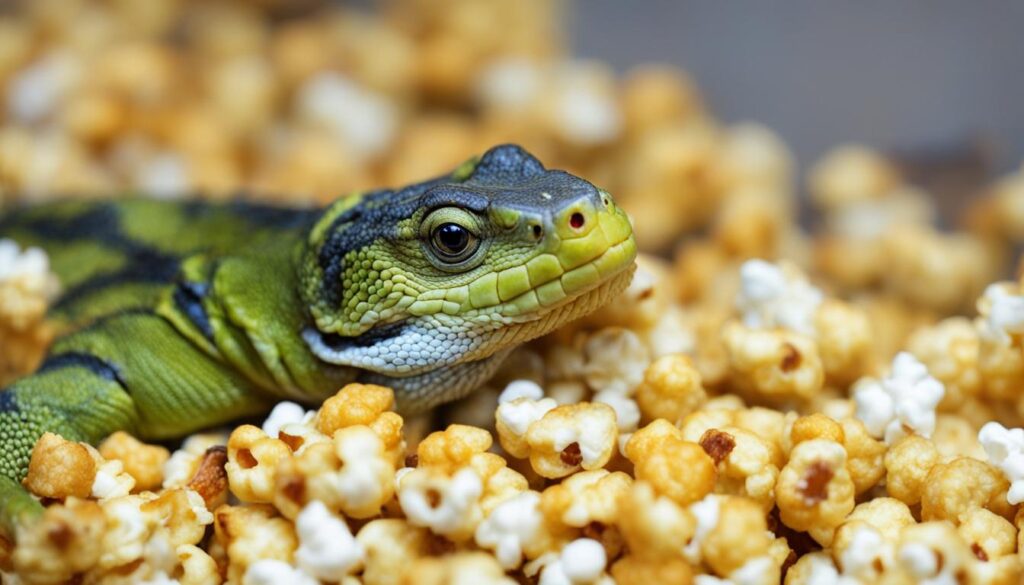
When it comes to reptiles, their eating habits can vary greatly depending on their species. While some reptiles are herbivores and can consume fruits and vegetables, popcorn is not a suitable food option for most reptiles. Reptiles have specific dietary needs, and their diets should primarily consist of food sources found in the wild.
For example, bearded dragons, which are omnivorous, can eat a variety of fruits, vegetables, and insects. However, corn, including popcorn, should not be a regular part of their diet. Popcorn contains a high amount of phosphorus, which can lead to metabolic bone disease in bearded dragons. Additionally, unpopped kernels can pose a choking hazard to them. It is crucial to provide a balanced and nutritious diet for bearded dragons to ensure their overall health and well-being.
Similarly, other reptiles like corn snakes cannot eat popcorn despite their name. Corn snakes are carnivorous snakes and primarily feed on small animals such as rodents, frogs, lizards, and birds. The name “corn snake” is believed to originate from either the checkerboard appearance of their scales or their tendency to hide near grain stores where rodents feed on corn.
Reptiles That Can Eat Popcorn:
- Some herbivorous lizards, like certain species of iguanas and tortoises, can eat small amounts of fruits and vegetables, but popcorn provides minimal nutritional value for them.
- It’s important to note that even for these reptiles, a diet consisting mainly of commercial reptile food and fresh vegetables is recommended.
Overall, if you have any doubts about what to feed your pet reptile, it is best to consult with a veterinarian or reptile expert. They can provide guidance on the specific dietary needs of your reptile species and ensure their optimal health.
Corn Snakes and Popcorn
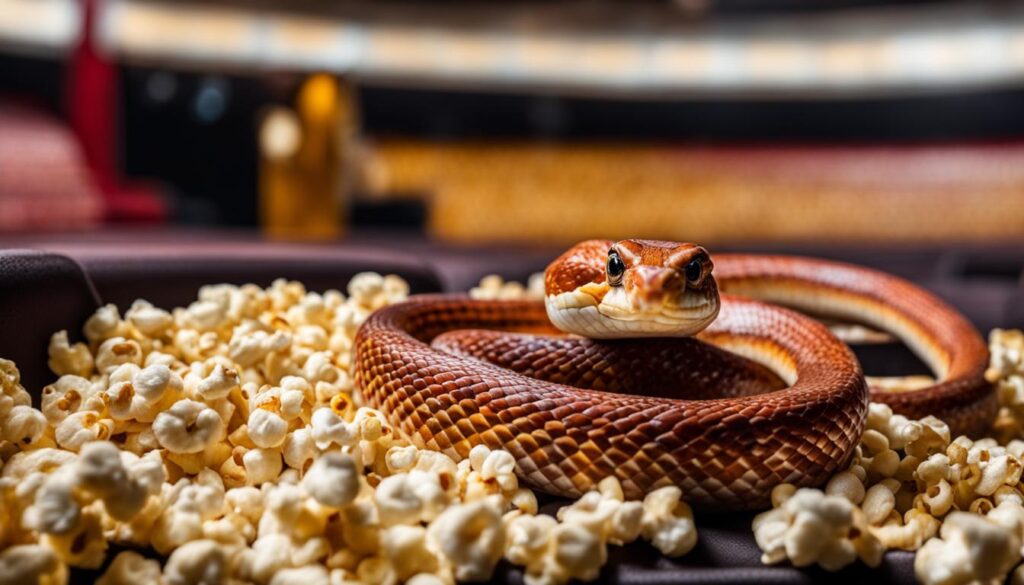
When it comes to corn snakes, their name can be a bit misleading. Despite having “corn” in their name, corn snakes do not actually eat corn or popcorn. Corn snakes are carnivorous snakes and have specific dietary needs that must be met for their health and well-being. Their natural diet primarily consists of small animals such as rodents, frogs, lizards, and birds.
So, can corn snakes eat popcorn? The answer is no. Popcorn lacks the necessary nutrients that corn snakes require in their diet. Snakes, including corn snakes, have digestive systems that are specifically designed to process whole, uncooked protein sources like rodents. Feeding them popcorn can lead to digestive upset and nutritional deficiencies.
It is important to provide corn snakes with a diet that mimics their natural prey items to ensure their proper nutrition and overall health. If you’re unsure about what to feed your corn snake, consult with a reptile expert or veterinarian who can provide guidance specific to your snake’s needs.
Corn Snakes Eating Habits
- Corn snakes primarily feed on small animals such as rodents, frogs, lizards, and birds.
- They have a carnivorous diet and require whole, uncooked protein sources for proper nutrition.
- Popcorn is not a suitable food option for corn snakes as it lacks the necessary nutrients they need.
- To ensure the health and well-being of your corn snake, provide a diet that mimics their natural prey items.
Bearded Dragons and Popcorn
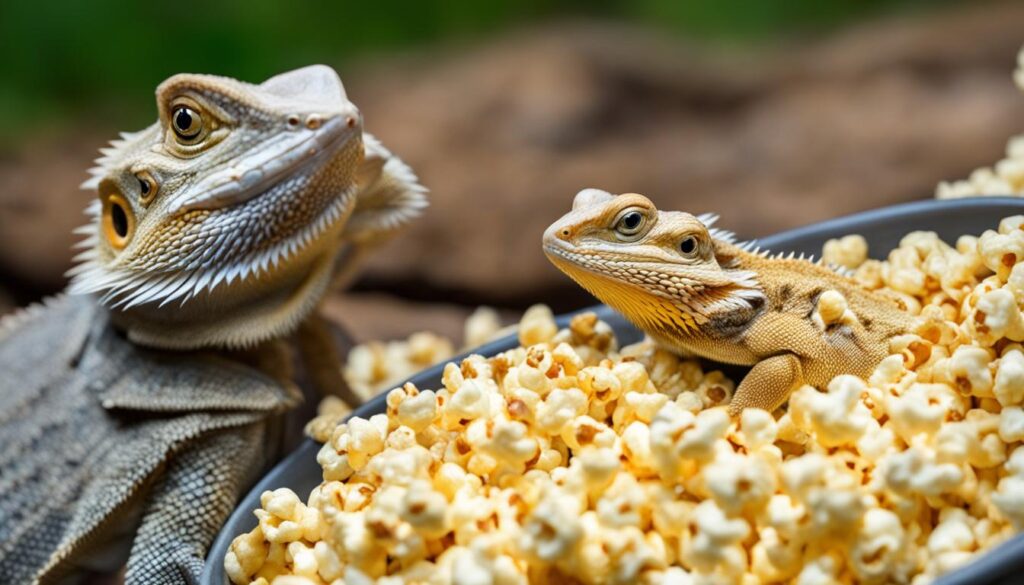
When it comes to the dietary habits of bearded dragons, popcorn is definitely off the menu. While these reptiles are omnivorous and can consume a variety of fruits, vegetables, and insects, corn, including popcorn, should not be a regular part of their diet. Popcorn has a high phosphorus content, which can lead to metabolic bone disease in bearded dragons. Additionally, unpopped kernels can pose a choking hazard to these creatures.
For the optimal health and well-being of your bearded dragon, it is crucial to provide a balanced and nutritious diet. Their diet should be rich in calcium, as bearded dragons require a higher calcium-to-phosphorus ratio. While occasional treats are acceptable, it is important to ensure that the majority of their diet consists of appropriate foods that meet their nutritional requirements.
If you have any doubts about what to feed your pet bearded dragon or any other reptile, it is always best to consult with a veterinarian or reptile expert. They can provide you with expert guidance and ensure that you are meeting all of your bearded dragon’s dietary needs.
Key Points:
- Bearded dragons should not be fed popcorn due to its high phosphorus content and the potential choking hazard of unpopped kernels.
- These reptiles require a diet that is rich in calcium to maintain their health and prevent metabolic bone disease.
- While bearded dragons are omnivorous, their diet should primarily consist of appropriate fruits, vegetables, and insects that meet their nutritional requirements.
- If you are unsure about what to feed your bearded dragon, consult with a veterinarian or reptile expert for expert advice.
Conclusion
In conclusion, snakes have specific eating habits and require a suitable diet for their optimal health. It is important to understand that snakes are carnivores and cannot eat popcorn or any other human food that is not a whole, uncooked protein source. Their digestive systems are designed to process small animals like rodents, and feeding them other foods can lead to digestive issues.
To ensure the nutritional needs of snakes are met, it is crucial to replicate their natural diet as closely as possible in captivity. This means providing them with whole, unprocessed, and uncooked proteins such as rodents or fish. While there are a few human foods that snakes can eat, they should only be given as occasional treats and should be researched beforehand to ensure they are safe for the specific snake species.
If you have any doubts about what to feed your pet snake or any other reptile, consult with a veterinarian or reptile expert. They can provide guidance and help you create a suitable diet plan for your snake, ensuring their optimal health and well-being. Remember, a proper diet is essential for a snake’s overall health and happiness.
FAQ
Can snakes eat popcorn?
No, snakes cannot eat popcorn. Their digestive systems are specifically wired to be carnivores, requiring whole protein sources for proper nutrition. Popcorn lacks the necessary nutrients for a snake’s diet and can cause digestive upset.
What do snakes eat in the wild?
In the wild, snakes primarily eat small animals such as rodents (mice, rats, voles), birds (eggs and nestlings), lizards (geckos, skinks, iguanas), and amphibians (frogs, toads, salamanders).
Can pet snakes eat popcorn?
No, pet snakes should not be fed popcorn. They require a diet that consists of whole, unprocessed, uncooked proteins such as rodents or fish. While there are a few human foods that snakes can eat, they should only be fed as occasional treats and should be researched beforehand to ensure they are safe for the specific snake species.
What other foods can snakes eat besides rodents?
Some snakes can also eat fish, eggs, worms, amphibians, insects, chicks, rabbits, and lizards. However, these should only be given as rare snacks, not as staple foods in a snake’s diet.
What reptiles can eat popcorn?
Most reptiles cannot eat popcorn. Reptiles have specific dietary needs, and their diets should primarily consist of food sources found in the wild. While some herbivorous lizards can eat fruits and vegetables, popcorn provides minimal nutritional value for them.
Can corn snakes eat popcorn?
No, corn snakes cannot eat popcorn. The name “corn snake” does not imply that they eat corn. Corn snakes are carnivorous snakes and primarily feed on rodents, frogs, lizards, and birds.
Can bearded dragons eat popcorn?
No, bearded dragons cannot eat popcorn. Popcorn contains a high amount of phosphorus, which can lead to metabolic bone disease in bearded dragons. Additionally, unpopped kernels can pose a choking hazard to them.
Conclusion
Snakes are carnivores and cannot eat popcorn or any other human food that is not a whole, uncooked protein source. It is important to replicate a snake’s natural diet as closely as possible in captivity to ensure their nutritional needs are met.
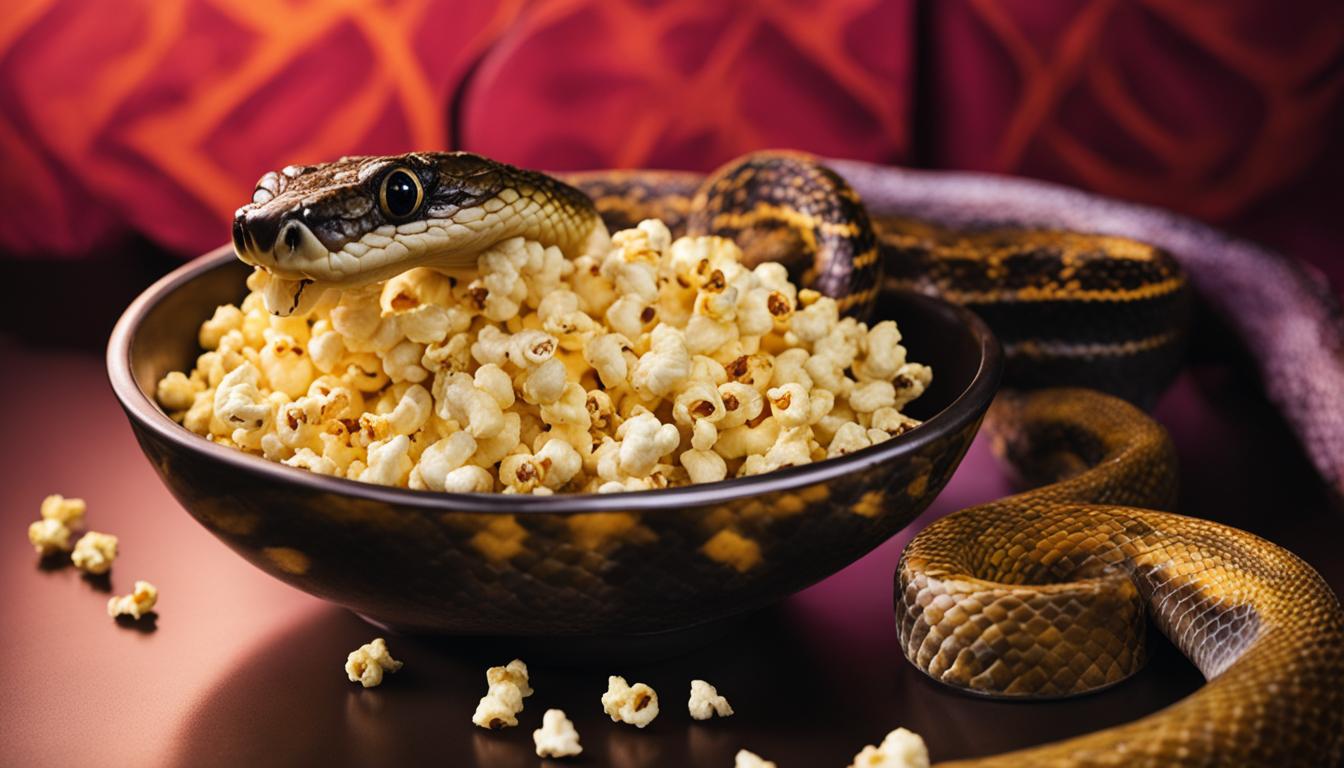
Leave a Reply